Clipchamp, Canopy Tools, Tanda among top QLD tech companies
As electric charging firm Tritium become the state’s first $1bn company, here are five more cutting edge companies with big plans to keep an eye on.
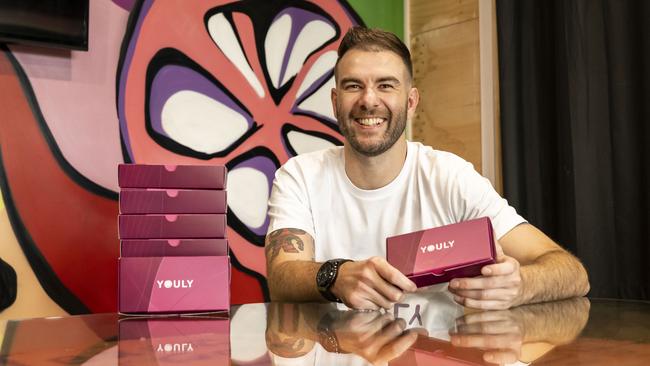
From world-leading fintechs to global video editing platforms, Queensland’s tech industry is teeming with companies to watch. Here we list five under the radar firms, some of which plan to raise millions this year, that investors should keep an eye on.
Canopy Tools Group
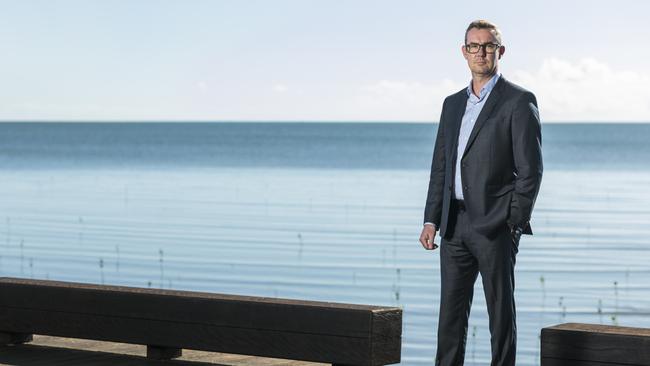
Craig Adams reckons there’s an ocean of data out there looking for meaning.
And that’s what Canopy Tools Group is doing within the Internet of Things (IoT) realm which encompasses the billions of physical devices around the world that are connected to the internet — all collecting and sharing data.
The chief executive and co-founder of Canopy with Dan Pearson, Mr Adams said there was a sea of raw data generated by IoT devices which is forecast to reach 73.1 million petabytes by 2025.
“It’s important to remember that data itself is not the answer, data itself doesn’t provide an outcome,” he said.
“There’s so much of it flying around and a lot of businesses are not managing or using it the way they could. It’s all about how they harness the data.
“Our software focuses on collecting the data from IoT or connected devices, then analysing that data and taking action based on the analysis and criteria that’s set by the customer.”
Headquartered in Brisbane, Canopy started in 2009 as a cloud-based business hosting data centres and evolved into an IoT-focus data analytics company.
The company has doubled their team in the last two and a half years to 88 full-time staff around the world working with a range of clients extends across healthcare, defence, education, facilities management, government, housing, tourism, bio-secure cruises and mid-tier organisations.
Mr Adams said an important part of the process was the conversation with the customers.
“If you look at a lot of companies they have an enormous amount of data available to them and quite often that data is ignored,” he said.
“When they realise what they can do with that data, it’s actually a light bulb moment for them and often the catalyst which encourages them to take stock of all the data at their disposal. It’s actually a really good opportunity to get their house in order.”
Mr Adams said Canopy recorded an increase in revenue every year since 2017 and in 2019-20 its audited result was $17.2 million.
Last last year Canopy closed a $21 million pre-IPO fundraising round in advance of a potential float. While at this stage there is no scheduled float date, there was the potential for a further capital raising in the near future.
Mr Adams said the IoT market “grows exponentially by the day” with estimates that in a few years there will be 75 billion connected devices in the world ranging from an object simple in the bankcard to as complete as a state of the art warship.
And it’s not just the raw data producing big figures with and estimation that by 2025 the IoT will have a global economic value of more than $4 trillion.
Mr Adams said with offices or a presence in Australia, New Zealand, Singapore, Philippines, Vietnam, the UK and the US, Canopy was well positioned to take advantage of the sector’s untapped potential.
“What we’re talking about is the potential for hyper growth and what that really means is that you’ve gone from your normal growth cycle over a period of time to an expediential type of growth over a smaller period of time,” he said.
Mr Adams said currently Canopy was focused on the Asia Pacific and particularly the UK’s $80 billion IoT market where they have increased staff from two to 14.
“We also have plans to get into the US market. Importantly, we just don’t sell to the global market but we actually operate in those areas as well and have a relationship with customers in those areas.”
What other Australian start up impresses you?
“There have been a number of Australian start-ups that have impressed me. Empired which is out of Perth is one and the other unicorn is Atlassian which is worth about $50 billion to $60 billion now. They started out as a bootstrap software company in someone’s garage and the two founders are still the majority owners of the company.”
Send Payments
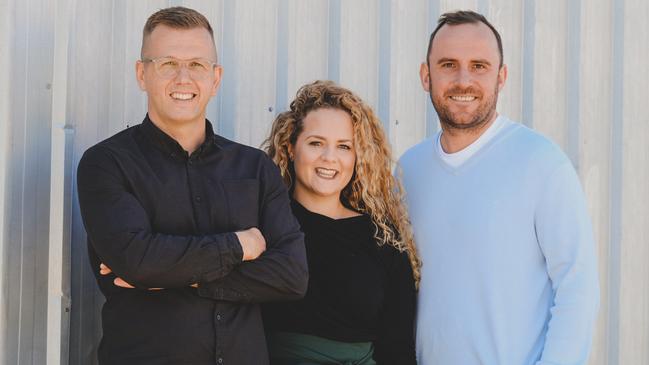
It’s about as under the radar as you can get with its tech secretly sitting behind some big players in the money exchange space.
Send Payments co-founder Paul Billing, 37, said the company, headquartered on the Gold Coast, has grown quickly from inception two years ago and is looking to expand further.
Billing says for a country with a huge amount of foreign currency exchange transactions, Australia has lagged behind with one of the most expensive systems beset with delays and compliance issues that Send’s platforms aim to fix.
The firm’s products are used by Flight Centre’s Travel Money Group, Woolworths Team Bank, as well as for Jetstar.
“We also work with some of the best relocation companies such as Grace and Crown. We have just signed a great relationship with Pepperstone,” Mr Billings said.
“By proxy we are probably the biggest payments company in the world that no one has ever heard of,” he said.
“There is no vanity there for us. We are there to get in behind the scenes and improve what’s on offer.”
“We’ve grown 20-30 per cent month on month,” he said noting it now had about 30 staff currently across Australia, New Zealand, the UK and the Philippines.
He said Send would start to “seriously look over the next few months” to raise between $5 million and $10 million.
“We have got to the point with larger clients now that we need to build quicker and have more product maturity,” he said.
“We are thinking that in the coming months it then makes sense for us to do our first institutional raise with the rationale being we have the clients all ready to sell to.
“We are ready to scale those opportunities, that comes at a cost. We need more bums on seats but off the back of that we will have more diverse products.”
He said Australia’s location and population makeup meant huge potential.
“We have one of the top five most transacted currencies in the world and yet we have the second or third most expensive currency transaction mark ups,” he said.
“So we are a country of immigrants that move money all around the world and it’s one of the most expensive to do so.”
“The big challenge we have had to solve is creating value for the end consumer and also the partners and enterprise businesses we work with.
“It’s a hyper competitive market.
“We have had to create one platform to holistically manage payments from the first mile to last mile.
“That means we can move things cheaper and quicker than anyone else but also increase transparency of what’s going on in the background.
“It is complex to move money from A to B and the only way to tackle that was to build a linear way and that allowed us tackle pricing.”
What other Australian startup impresses you?
Other trading platforms such as Ripple, Coinbase and CoinSpot are doing amazing things.
Clipchamp
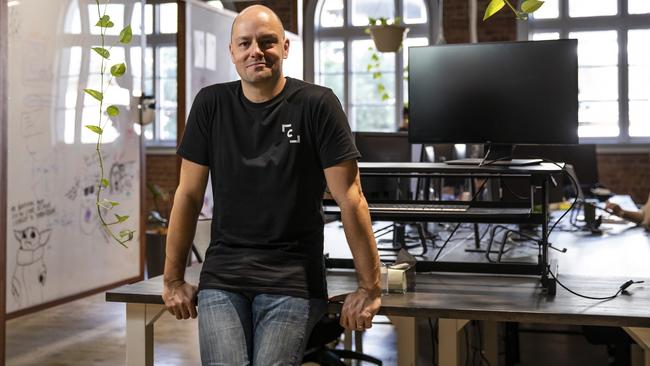
A global video editing platform has added an extra five million registered users over the past 12 months with a surge of activity in non-English speaking countries backed by a range of new product features and collaborations.
Brisbane-based Clipchamp notched up 16 million registered users in April — up from 10 million just 12 months ago — with a growing customer base of more than 390,000 small and medium-sized enterprises, Fortune 500 companies, creators and influencers.
The company’s co-founder and chief executive Alex Dreiling said up to April year-on-year template usage was up 183 per cent with the coronavirus pandemic creating a “permanent impact” on the use of video platforms, with businesses needing to stay in contact with clients during lockdown.
Clipchamp is acquiring twice the amount of users compared to the same time last year and usage rate has doubled as well with a surge of internal business communication usage.
Mr Dreiling said Clipchamp almost tripled its team since the start of last year to 89 to cater for global expansion plans.
“We continue to experience strong user and customer growth internationally, particularly in Spanish-speaking countries, Brazil,India, Philippines and Indonesia,” he said.
“Our international growth also translates into growth of our team outside Australia, with a growing number of people in the US and Philippines in particular.”
Clipchamp is an in-browser platform which gives users access to video editing tools and features, from simple cropping and resizing, to special effects like transitions, motion titles, and Green Screen.
It has partnered with Dropbox and Box to enable customers to import and export their content with ease. Last year Clipchamp launched several features to help accommodate changing user needs, including webcam and screencam recording, green screen, audio-video separation and freehand positioning of video elements.
Clipchamp, which launched in 2014, has a variety of backers including high profile Queensland entrepreneur Steve Baxter.
Mr Dreiling said they have raised about $14 million and in the future will be looking to raise more to expand its rollout of intuitive features and focusing on collaborations with major online platforms.
“By building deeper product integrations with partners including Google, Microsoft and Pinterest, customers can create videos with greater ease and accessibility, by importing their favourite assets and exporting to their primary channels,” he said.
“Our integration partnership with visual inspiration platform Pinterest is particularly exciting as the company boasts a global monthly active user base of over 459 million.
“The new collaboration allows Clipchamp users to create video Pins from our platform using one of our Pinterest video templates.”
What other Australian startup impresses you?
“Here in Brisbane, Kapiche comes to mind, Floodmapp or ProcurePro,” Mr Dreiling said.
“Carted is just getting started off the back of the e-commerce boom the pandemic caused with a huge vision. And Mr Yum in Melbourne had all the reasons to fold when the pandemic started and people couldn’t dine out anymore.”
Youly
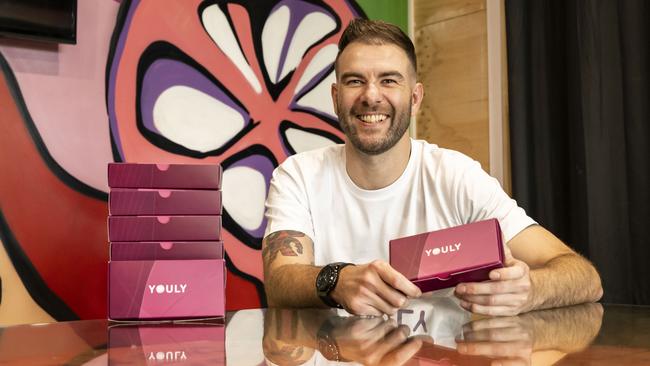
While a new player on the scene, this startup has honed in on a very specific market that it sees as ripe for disruption.
And rise of telehealth during Covid-19 has played right into the hand of Brisbane entrepreneur Nic Blair and his latest venture.
Billed as providing Australia’s first emergency contraception delivery, Youly was launched by Mr Blair in February to target what he saw as gaps in women’s health for hassle-free and discreet access to medical treatments.
With cash from the sale of his previous digital marketing business, serial entrepreneur Blair was researching where next to make his move just before the pandemic hit.
“I was having a look at the telehealth space and a few businesses in the US doing some cool things in this area and starting the process of conducting research,” he said.
“With anything that disrupts the world, there is opportunity and that’s (Covid) definitely created opportunity for telehealth and e-commerce businesses in general.
“Australian consumer habits didn’t steer towards telehealth but as 2020 hit that changed.”
The next six months saw him connect with pharmacists, one of which came on board the business as a partner.
Mr Blair said the research kept showing women’s health as having problems that needed solving, such as long wait times for appointments and awkward experiences when getting medications.
It also came as Covid saw telehealth boom across Australia.
With $450,000 he and his partners built the platform that currently offers assessment, consultation and fast delivery of prescription and over-the-counter medication from emergency contraception to thrush and cold sore treatments.
He said the company was currently seeking investment from venture capital firms in Brisbane and Sydney with a view to raising $500,000 now and up to $2 million later in the year.
“Every week is about continuing growing that pharmacy network so we can expand where we can offer these services,” he said.
Mr Blair said Youly now had 50 pharmacies and eight doctors in its network who triage clients that come through the online platform.
The client either has a telehealth appointment with a GP who can then write e-prescriptions that are sent to a Youly pharmacy and delivered to the patient’s door.
Or for over-the-counter medication, a pharmacist oversees the order directly with same-day delivery available in Brisbane, Sunshine Coast, Sydney, Melbourne, Adelaide and Canberra.
Mr Blair said it was the first of several areas the Youly platform was designed to power with men’s health and medicinal cannabis other growth markets.
What other Australian startup impresses you?
“I’ve recently been very impressed by Greg Taylor and his startup Step One underwear,” Mr Blair said. “I’m always impressed by someone that can achieve huge success in an industry that’s already oversaturated and highly competitive.
“I believe they’re on track for over $70 million in revenue this year in such a short timeframe and have done an exceptional job on their marketing strategy which has obviously translated into some great success,” he said.
Tanda
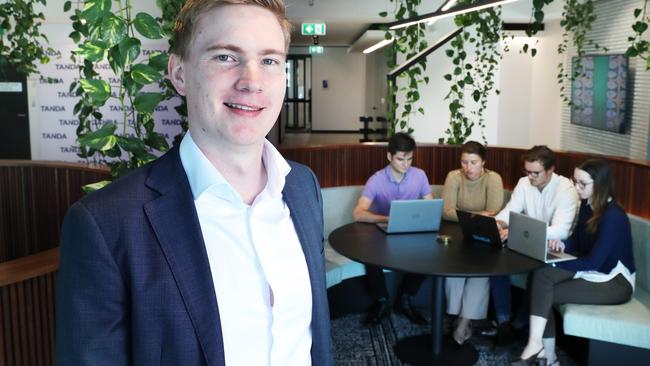
It’s the start up tech company that investors would love to own a piece of.
It all began when four QUT mates were trying to figure out why their student bar was losing money and paperwork and what was created from those discussion — Tanda (the shortened version of time and attendance) — has grown into a global powerhouse with 10,000 companies on the books.
Alex Ghiculescu, Josh Cameron, Jake Phillpot and Tasmin Trezise — who launched Tanda in 2014 with the software to automate the payroll process for shift-reliant companies — still own the company.
It is the ultimate bootstrap company which has grown without needing to raise outside funds and the four shareholders have no intention to do so in the future.
As a mark of success as a tech start up Tanda has their signage on top of an office building that houses their new Australian base at 545 Queen St in the Brisbane CBD.
Unfortunately, the four owners were not there to see the sign go up because they’re holed up in their US base in Chicago unable to return home because of the Covid-19 pandemic.
However, Brisbane-based general manager Phil Johnson, 30, said it was business as usual with Tanda which is focused on global expansion.
He refused to disclose revenue figures or forecasts other than to say that revenue keeps increasing with Tanda having a presence in seven countries and offices in Australia, the US and the UK.
Among the thousands of businesses on their books in Australia there are Dominos Pizza, Bunnings, ALH, Betty’s Burgers, Boost Juice, Grilld and The Cheesecake Shop on their books.
While they continue to refine and update their software Mr Johnson said they have no plans to introduce other applications.
“Our goal is global expansion and in Australia we are focusing on payroll compliance,” he said.
“That’s the main offering and our philosophy has always been to double down on that area of the business.
“When you look at the sorts of clients they are all shift worker industries. That’s the main controllable cost for them and also the main area for the best customer outcome.”
Mr Johnson said they were working on the “localisation” of the product to deal with industrial relation laws of those countries.
“In Australia basically what we’re doing now is looking at the shift in compliance obligations for employers from payroll perspective reporting to the ATO and build out a couple of years ahead of where we think legislation will be,” he said.
“When we go to other markets you will find a local version of that.”
Mr Johnson said Tanda currently had more than 100 staff globally and 60 in Brisbane.
“Our staff levels have actually been flat for the past two years,” he said.
“While our revenue has actually increased, our staffing is about corporate efficiencies. We now have a lot more senior staff on the books.
“We’ve gone towards being heavily skewed towards graduates and bright young developers and now we have some grey hairs in the room with a lot of senior hires in key positions.
“It’s just a point of time in the maturity curve where we needed to get the next level up in skills and there is also value in internal mentoring by having those team leaders there.”
What other Australian startup impresses you?
“Safety Culture started in Townsville and I think they’re an impressive story,”
Tanda general manager Phil Johnson said. “They have a billion dollar valuation. They offer a safety checklist that ticks off the statutory obligations in the workplace which highlights the type of software that does well in Australia.”






To join the conversation, please log in. Don't have an account? Register
Join the conversation, you are commenting as Logout